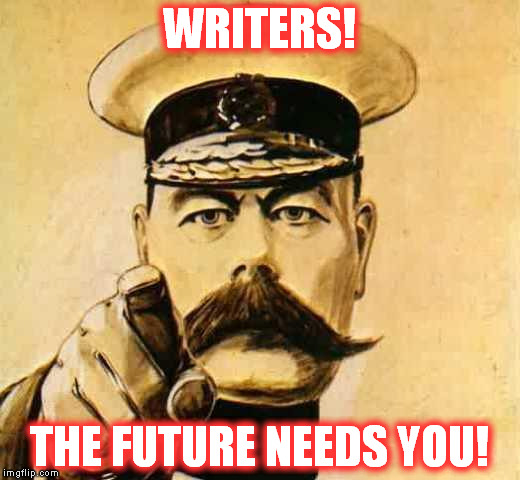
A writer’s rant from the archives…
It was the final straw… yet another article about how a stupendous programme can increase your readership. This one touted its ability to engage a reader’s emotions, based on statistical analysis of the emotive terms included in the title. It will even find a title for you, if you like. All SEO friendly, of course.
I can’t be alone… surely there is something wrong with that concept… But wait, maybe it is just me…
So, refusing to judge on a preconception, I wandered over to the aforementioned site to see what it would offer. Then, in disgust, tapped ‘headline generator’ into the search bar and checked out a few more such sites while my blood pressure quietly rose.
For goodness’ sake… are we and our readers supposed to be mindless morons? Is this the future of writing? Do we really want to be dictated to by a mechanised mind that will self-avowedly grab attention by manipulating emotions, based purely on whether the statistics say it will sell and without necessarily having any relevance or integrity at all?
Why robots are better than sex!
Computer-suggested title for this article.
Or maybe we want to read computer generated novels or poetry? Oh yes, they’ve been capable of doing it for years…but, I think not. Where is the soul in that?

I’ve ranted about the misuse and dangers of editing software already.
If this seems acceptable, I might as well throw away my pen right now. Except, I am stubborn and reactionary and I’ll be damned if I let what can be an incredible servant of the imagination become a despot.
I don’t want to write like a robot.
I don’t want to read computer generated writing. Including headlines.
Apart from anything else, isn’t that why we have imagination? What happens when imagination goes the same way that memory has since the advent of mobile phones? How many numbers did you used to be able to remember. Now, are you even confident that you know your own? I’m not… and I used to have an entire portfolio of clients and suppliers at the tip of my dialling finger.
That’s not scientific evidence, just a personal observation. On the other hand, the electronic age is having measurable and detrimental effects on brain structure, memory, empathic ability, social skills and even the ability of our children to play. I’m not referring to fringe science or debatably fluffy ideas here, but scientific fact, backed by numerous studies from reputable bodies that come complete with substantiating data and scans of the brain.
We have, in a few short years, become so dependant on our technology that we will no longer wrack our brains to recall information…we’ll ask Google. We don’t need to read maps, because the sat-nav tells us where to go, do arithmetic or memorise anything… we can always Google for the answers.
On the other hand we can save previously unsaveable lives, restore quality of life to many who have lost it, reach out into the universe around us and send nano-bots into inner space. In an age where miracles become possible daily through the amazing advances in technology, it would be typically ironic if the human race was simultaneously shooting itself in the proverbial foot.
Use it or lose it.
I’m a reader…and a writer…because I happen to like the creative quirkiness of the human mind. I like to hear the voice of a writer as I read… I like those odd turns of phrase, the sly puns, the clever metaphors. I enjoy humour and double entendre. I love lyrical prose and the poetry of the seeking soul that pours out words like wine.
The human mind is an incredible thing. Science knows a great deal about the brain, but much of the mind remains undiscovered territory, full of wonders and surprises. Imagination is the ability to conjure something magical from nothing, it is behind every act and every emotion…everything that makes us human. It is the force behind the invention of all these machines, programmes and tools that should serve us, not rule us. Should we really put it at risk for good SEO?
Melodramatic? A bit over the top? I wonder.
Ditch the generators, settle for a few less potential readers who probably came for the allegedly catchy headline about why robots are better than sex. You are a reader and a writer, a musician, an artist or an inventor.. a creator because of your imagination and the creativity that is sourced there.
Use it, revel in it, explore it…and protect it.
*The top one was computer-written in case you were wondering, though it is scary that we need to wonder at all.

Links to external articles and research.
Business Insider UK on CG authors.
Digital Dementia from Alzheimers.net
Is your Satnav harming your brain? MailOnline.









































Right on Sue; use it or lose it. All the fun of writing is using our own creativity. ❤
LikeLiked by 2 people
Absolutely, Debby. ❤
LikeLiked by 1 person
❤
LikeLike
Thank you for this thought provoking article Sue. Those behind the companies selling/manufacturing products who claim that their technology can increase readership or furnish a title ensuring your book will go viral do, I believe need to be taken with a sack full of salt. They are, after all in the business of money making so it is in their interests to exaggerate/hype the capabilities of their programmes. Programmes writing novels/poetry? One can never say never, for, at the start of the 20th century many intelligent people believed man would never reach the moon and, of course it happened in 1969. In my home I have a Roomba robot (robotic) vacuum cleaner. It is an old model which I have owned for at least 10 years. Its cleaning efficiency is roughly equivalent to that of a carpet sweeper. However one has to remove electrical cables or anything else with which it might become entangled so as to avoid smashed lamps etc! I havent used the device for many years as my upright vacuum cleaner is far more efficient. Besides the Roomba cant iron, dust and perform other household duties, so I dont think the lady who cleans my home once a week has anything to worry about, as humans are far more flexible in performing such tasks. Maybe in the distant future we will see an all-purpose household robot. It will, in my view (if indeed it happens at all) be in the very distant future. Given that the all singing, all dancing domestic robot has still not materialised, I think that the programme capable of writing poems as profound as Keats “Ode to a Nightingale” are eons away. I am reminded of the argument that because (at some future date) one might be able to have an implant giving access to the whole of the information on the World Wide Web that this would render one highly intelligent. Having access to information and being able to use it intelligently are, of course 2 very different things. A computer programme could soak up much of the poetry out there but without the ability to feel what the great poets felt it would, I suspect be a rather poor immitation of Keats, Shakespeare and Shelley. I agree with you about the effect of technology on memory. I cant remember the number of one of my oldest friends (its stored in my mobile). I do, however remember both his work and personal email address. Best, Kevin
LikeLiked by 1 person
I love the advances we have made technologically during my own lifetime. I cannot imagine life before the web…yet I lived that way for most of it. The advances in robotcs are amazing and exciting, especially where medicine is concerned. As long as we remember that these things are designed to serve us, not control us, …
But poetry? Until they can create a robot with a feeling heart and singing soul, I don’t think we have much to fear.
LikeLike
I suppose it will happen eventually, but I agree with Kevin about the ability of a computer to generate something as profound as ‘Ode to a Nightingale’, although I fear it will come sooner than many think. I’m glad that I won’t be around to see it when it does.
But, equally, I’m always slightly mystified as to why anyone thinks it would be a good idea. Do we deliberately want to destroy all creativity in humans and turn them into robots that only consume? I know that many scientists and engineers seem to think that if they are capable of doing something, then they have a right to do so – possibly because they spend too long in their labs and need to get out more – such as making more destructive weapons and all the technology that destroys jobs, but that doesn’t mean that they should. When computers are capable of writing books and painting pictures, producing sculptures and films and even weeding the garden, then we might as well all take an overdose as they’re be nothing left to achieve.
Sorry about the rant.
LikeLiked by 3 people
If one believes the proponents of Transhumanism, such as Ray Kurzweil, brain implants will greatly enhance our intellectual capacities. So it wont be a case of computers replacing us, rather man and machine will merge to create a humanity with far superior powers to those possessed tby today’s people. I am, by nature sceptical of utopias as they have a horrible tendency to end in tears. Also, as I said in my earlier comment, I believe that those working in the field of artificial intelligence have a tendency to exaggerate (not all of course but a fair number of them). I agree with you about people getting out more. Maybe in the future it will be a mark of distinction to own a work of literature or other art form wholly produced by humans.
LikeLiked by 3 people
Ooh, I’m terribly suspicious of the very idea of implants. Enhance or control? Of course, our leaders are always noble people who have nothing but the greater good of mankind at heart…but even in that (Utopian) situation, that would only be an interpretation of what is good for mankind. ‘For the Good of the Cause’ – both the book and the general idea come to mind. But even in the case of a wholly benign implant, where does man stop and machine begin? I shudder at the thought.
LikeLiked by 3 people
I have some sympathy for your point of view Mick. There are, however grey areas. For example implants have already been developed enabling paralysed people to control robotic devices, enabling them to manipulate objects, thereby enhancing their independence. Again cockleaa implants are allowing hearing impaired individuals to hear better. Few people would wish to sacrifice such inventions and (I suspect) you, yourself would not wish to do so. Other than the prospect of a less than benign government abusing such technology, there is the risk of hackers doing so for financial gain. Work is already being done to protect smart devices, such as white goods from hackers and the issue (obviously) becomes even more important when it comes to implants in human beings.
LikeLiked by 2 people
Yes, hacking was something I hadn’t thought of. No, I would certainly draw the distinction between something such as the implants you mention, and something that was intended to give someone ‘super powers’, as it were. I don’t see that as necessary.
Your mention of the white goods, for example, needing protection from the hackers, always makes me smile. The idea of someone hacking into a fridge or somesuch just has to be the subject of a humorous short story!
LikeLiked by 2 people
Yes, there are certainly possibilites in the idea of a short story about someone hacking into a fridge. Perhaps a died-in-the-wool tea totler finding there fridge stocked full of beer as hackers have ordered it by the crate load!
LikeLiked by 2 people
Go for it, Kevin.
LikeLiked by 2 people
Perhaps I will, Mick.
LikeLiked by 2 people
Of course I agree with every word you say. And I’ve never turned to a computer to generate post titles. But some darkly geeky part of my brain still wants to slap me upside the head because I shamefully admit to wanting to know why robots are better than sex.
[cut to visions of The Orb from Woody Allen’s Sleeper…]
LikeLiked by 3 people
Ignore all the B.S. and focus on writing incredible things.
People seek out the good writing, and are constantly developing new technologies to FIND those good writings. Search algorithms will improve, and quality is recognizable.
Write something worth reading.
oh yeah, and have fun doing it =D
LikeLiked by 1 person
p.s.
humans are creatively composing beautiful line of code to program robots. we invent tools, its what we do.
More robots means human creativity is going to be increasingly important in the future. Its just another step in the journey, like going from hitting stones together to make sparks for fire.. to using butane lighters.
Machines are what make humans special.. we are the architects, artists, engineers, writers of these machines. If it werent for the machines like the printing press..
well we wouldnt even be able to discuss this !
There’s always room for some healthy skeptism, however 🙂
i wrote this after reading comments, BTW, and now ive gone off on a tangent…
enjoy!
artfully,
yours truly,
popcrate.
using science 4 good and justice.
LikeLike
Technological advances are an aspect of human creativity indeed… but my concern is when we allow such technology to rule us, rather than serve.
LikeLike
valid point, although I would like to rephrase saying that the concern is How We Use the technology we have created. It may feel like robots are getting “smarter”, (and it makes for great science fiction), but in reality everything has to be programmed by a human, and the electricity has to be produced at a power plant built and maintained by a human. The extent of “artificial intelligence” and “machine learning” at the moment is basically just pattern recognition based on patterns u start with. (ex. identifying what a sound is, based on other sounds you already know)
And again, I’m far more concerned about Humans using technology (like weapons) than I’m afraid of the technology itself.
If all the humans on Earth vanished tomorrow, the machines we have currently built wouldnt stand of surviving on their own, and wouldnt even be able to rule over a cat. (that is, if anything can even rule over a cat!)
LikeLike
I was speaking in a more abstract way than a sci-fi application of a ruling class of robots. The way we allow our technologies to rule and shape our days, instead of simply enjoying the beauty of the world and our place within it.
LikeLike
(here is anothe sci fi application, but bear with me because its somewhat relevent lol)
that makes me think of virtual reality, if it got out of control, and people began to prefer the virtual world more than the real one… o_0
As far as letting technologies shape our days…. its true. If the power went out for years (i think there was a tv show recently about that).. most of the entire infastructure of the planet would collapse. most People’s day to day lives would significant change, either directly or indirectly. modern society definitely is allowing our technologies to “rule us” in that sense.
Thanks for letting me blow up ur comments, and for responding 😀
Hopefully some of it has been thought-provoking 🙂 or at least interesting.
LikeLike
We are indeed reliant on technology for the world we know…and those technologies make our lives so much better and wider than ever before, in so many ways. Yet life itself is all around us and it is, as you said, human creativity that produces technology… my fear is how much of it we hand over to our own creations and forget how to engage it ourselves. If need ceases to be the primary driver of our inventiveness and we turn to a more decadent lifestyle, the only way is down.
Glad you came over to comment… sensible and informative discussion is always appreciated 🙂
LikeLiked by 1 person
I sense and I hope that just around the corner there will be a revolution and future generations will want to go outside to play, to paint without programs, to write with their imaginations. The first time I saw a painting done by an artist using a program I was shocked, frightened even. Give me the splodge on a pristine white canvas, give me the ramblings of a writer on over hyper imagination. Please, give me those poets who dare to dream but don’t give me a computer generated alternative.
LikeLiked by 3 people
I enjoy technology. I use a computer on which to write most of the time…but the words are my on. I paint with paints, pencils, pastels…and a stylus on an electronic drawing tablet. The pictures are also my own. The tools don’t matter…as long as they stay as tools through which human creativity can be expressed. But, I agree, you can’t beat the smell and feel of paint on canvas…and that is something a computer does not offer.
LikeLiked by 1 person
That is very true, Sue. xx
LikeLiked by 1 person
I write. It’s a physical, mental, spiritual and emotional act. So I don’t want or need something to tell me how. Thank you Sue.
LikeLiked by 3 people
Agreed, Colleen.
LikeLiked by 1 person
To have that concept work to the same standard would require a computer programme which will duplicate the processes of the human mind exactly and since we don’t know exactly how the human mind works….An’t gonna happen m’am.
The only human emotion programmes seemed to be able to duplicate is the headless chicken mentality required in the financial markets when things go rocky.
Companies will try and sell us anything.
(OK I’m done hrrrrumphing)
LikeLiked by 2 people
There is a lot that can be done by the existing programmes…but all they are doing is collating previously published expressions of the human heart and mind. They might even be good enough to fool an unsuspecting reader…but are they adding anything to the well of understanding? How can they…
LikeLiked by 1 person
I agree, nothing new, they’ll simply repeat, formulaic.
LikeLike
Yep…
LikeLiked by 1 person
I get a lot of offers of this kind in my email. Free for however long if I will merely try it out then try to sell it to my “people.” I don’t. I won’t. I wouldn’t mind a really GREAT spell-checker, but that’s about it for me. Though … you know … a headline maker? Well … hmm.
LikeLiked by 2 people
Agreed… with an intelligent spell checker that understands context ( and my desire for British English spelling!).
LikeLike
Reblogged this on Kate McClelland.
LikeLiked by 2 people
Your points are well made and on the money, IMHO, however I actually laughed as I made my way down the page and through the comments. Having listened to numerous podcast interviews with researchers working on AI (or on teams including AI in neuro-research), I know too well how far we are from anything that could possibly replicate human creativity. The more they attempt to model it to study it, the more likely they are to admit is simply isn’t likely to happen.
We’re safe – except for SEO marketers who would try to sell anything to bloggers whose only concern is the number of landings or clicks to read – and politicians who use metrics algorithms to influence voters (a particularly heinous one in office currently, btw, right here in the used-to-be-good-ole USA). I guess nobody told him it was developed with the help of research funding.
Nanobot technology is already in use in medical applications, however – targeted to deliver cancer-killing substances directly into tumors, sparing the surrounding tissue. A good friend of mine would have been dead over 6 years ago (inoperable brain tumor) had he not gone abroad to participate in an early study.
xx,
mgh
(Madelyn Griffith-Haynie – ADDandSoMuchMORE dot com)
ADD Coach Training Field founder; ADD Coaching co-founder
“It takes a village to transform a world!”
LikeLiked by 1 person
We don’t understand the brain entirely, let alone the mind or creativity… My biggest problem is trying to work out why they would want to synthetically imitate it anyway!
LikeLiked by 1 person
Many of the scientists who are attempting to do it are trying to understand how the brain works so they can figure out what’s going on when there are problems. Hasn’t been working well for them, however. The brain doesn’t utilize a computer model.
xx,
mgh
LikeLike
That’s a better application of science… but no, there are far too many variables in the human brain and mind. xx
LikeLiked by 1 person
Unfortunately, funding is relatively easily available for AI research — and even scientists need to eat. But I agree, there are many more places their skills could be applied that would make a much bigger difference.
With the disgraceful lack of science education in our current administration (with HUGE projected budget cuts for science – even medical and especially environmental), I shudder to think about the future of scientific research in America if Congress does not – pardon the expression – locate its balls and vote NO.
xx,
mgh
LikeLiked by 1 person
Interesting post, Sue. After all, the brain is a muscle and needs exercise. I dread to think what will happen to mankind if we don’t use it much. 😦 — Suzanne
LikeLiked by 2 people
H. G. Wells speculated on just such a scenario in “The Time Machine”. In the novel the dwellers of the earth seem to live an idilic life with all their needs catered for. They have relapsed into a sort of second childhood, while below ground the “Morlocks” provide all the above grounders require, in return for a terrible payment …
LikeLiked by 1 person
As Kevin said, the scenario has been explored…and the results are never good.
LikeLike
Great post, Sue. I agree all the way.
LikeLike
Hmm… just came up with an idea for a novella – WIP title, “How early AI’s learned to write, before they killed off all the humans…” – – LOL Oh, Wait! I just aided/abetted the process by sharing my unique, one-of-a-kind brain (the world surely would self-destruct, if 2 existed….LOL) – Sigh – I turned off all auto-checkers, spell checks, grammar checks, etc., after my stroke – yes, more typos and mistakes, yes, sometimes my customers probably get tired of ‘taking care of me’ – despite my best efforts, but for me? If I depend upon such things, I shall lose the ability to get better at doing it myself. 🙂
LikeLiked by 1 person
I think ‘our’ job as dedicated writers, is to overwhelm the mindless computer generated/algorithm pleasing mindless fluff, with quality, unique copy – I’m also gearing waaaayyyyy back on which shares/links I even share or like on social media – if the share or re-blog refers to a site that is full of shock-value titles/ads, etc., I try to pass on by – no matter how useful the information might have been – – LOL
LikeLike
Discrimination and dicretion are also human gifts… 😉
LikeLiked by 1 person
I have a “post” (and by that I mean notes and thoughts and whatnot) on this. It was an experiment on this exact thing. I’ve never used one of these things for a title but did try out the titles I had after seeing generators mentioned so often. Every single one of my most popular posts got a C rating or lower. And the offered ones were ridiculous. Or maybe not. But not me. I write what I want and enjoy making up titles so… Eh. Some people really like SEO but I’ve never concerned myself with it. Which might explain my tiny audience but, still, I wouldn’t have it any other way. 🙂 I’ll pick genuine over numbers/ratings any ol’ day.
LikeLike